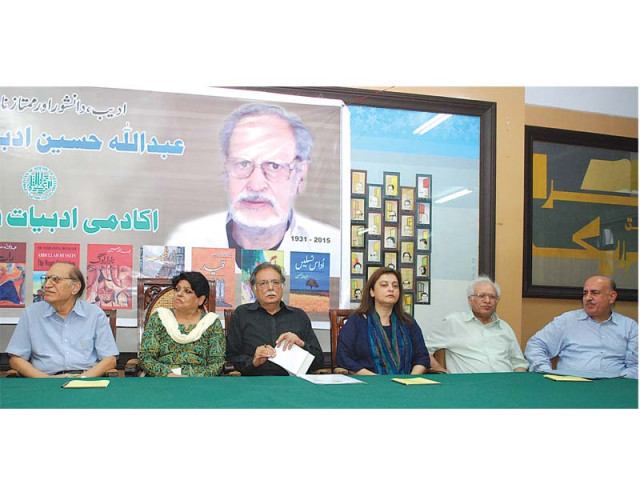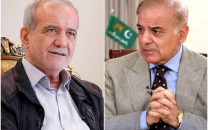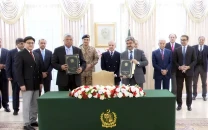Literary reference: Abdullah Hussain hailed as ‘a writer for the people’
Writers, poets remember legendary novelist

Information Minister Pervaiz Rashid and Poet Kishwar Naheed share the stage with prominent writers at the reference held at the Pakistan Academy of Letters. PHOTO: EXPRESS
In a literary reference organised here on Tuesday, writers, poets and government officials heaped praises on late Abdullah Hussain, a novelist par excellence, who died in Lahore recently.
The event was organised by the Pakistan Academy of Letters (PAL) to pay tribute to the legendary writer. The event was attended by a large number of writers and literates who knew the late novelist personally and through his work.

Abdullah Hussain’s novel “Udas Naslain” (The Weary Generations) remained the highlight of the event. The novel captured the multitude of problems that people of India faced during the 20th century up till the partition in 1947.
Minister of Information and Broadcasting Pervaiz Rasheed, poet Kishwar Naheed, Prof Fateh Muhammad Malik, writer Ahmed Javed, poet Ali Akbar Natiq, writer Masood Mufti, short-story writer Muhammad Hameed Shahid, Dr Ghazanfar Mehdi, PAL Chairperson Dr Muhammad Qasim Bughio and Abdullah Hussain’s daughter Noor Fatimah shared their fond memories with the late writer and reviewed his epic works. Abdullah Hussain other popular novels include, “Nadaar Log” and “Bhaag”.
Bughio said that in the death of the acclaimed writer, a void had been felt and expressed among all quarters. He spoke on the importance of literature, especially the literature of resistance, and its impact on society. Books such as “Udas Naslain” impact generations and transform societies, he remarked, while citing the epic works of Russian writers such as Dostoyevsky, Maxim Gorky, Tolstoy, Hemingway and others.
Masood Mufti recalled the criticism Hussain’s writing style received from contemporary writers when his novel first came out. He said that the critics argued Hussain’s writing style “ruined” conventional Urdu writing style and norms of the time with his “free styled” novel.
Mufti said Hussain always made a conscious effort to remain thoroughly honest and up-close with his readers. His writings reflected the miseries of war, Indian Subcontinent’s partition, social injustice and contemporary issues. He ignored any of the fashionable writing styles that his contemporaries adopted.

He said that his writings carried influence of the Punjabi language, which he used to help him connect with the native reader.
The former bureaucrat said that three novels covered the grave events leading up to partition and its consequences Quratulain Haider’s “Aag ka Darya”, Khadija Mastoor’s “Aangan” and later Abdullah Hussain’s “Udas Naslain”.
Prof Fateh Muhammad Malik said that Quratulain Haider’s critical novel opposed communal hatred that grew during the period. He said that the novel was criticised and Quratulain forced to leave the country by those who wrongfully saw it as against “national interest”. He said that Abdullah Hussain’s novel Udas Naslian further elucidated upon the events leading up to the partition.
Talking of Hussain’s most well-received literary work, Kishwar Naheed said that working as a chemical engineer at Dawudkhel Chemical Factory, Hussain strongly felt the need to write. He eventually did begin writing under the pseudonym “Abdullah Hussain” a name that he picked from the peon in his office at that time. She said that Hussain’s real name was Muhammad Khan.
Speaking about the process of English translation of his novel “Udas Naslain”, Kishwar told the audience that Hussain went to London and did not write anything for 12 years, until a friend proposed that he should translate his own novel into English.
Noor Fatimah, daughter of Abdullah Hussain, spoke about how her father was not just a famous writer but a very good story teller to his children.
“He used to tell us stories, every day before going to sleep and he knew all the famous fiction stories such as Alf Layla by heart,” she said, describing to him Sheherzad, a character in the popular work.
“He looked at his own life like one of his stories too. He was a liberal man who never got too emotionally entangled in his own life,” she said.
Senator Pervaiz Rashid said that Hussain’s novel was an exceptional hit in the regard that it managed to attract all sorts of readers at that time. “He was the writer of the people and for the people,” the minister said.
He said that during his student years there were three kinds of readers, those who would read about religious stories, those who read romantic novels and then there were those who read Ibne-Safi’s stories. “Hussain’s work was about wretched of the earth and popular with everyone,” the minister added.
Speaking of his unique style, the minister said that usually novelists try their best to use complex vocabulary in their writings but Hussain remained true to his cultural roots.
Ghazanfar Mehdi urged the minister to name a road after the writer.
Published in The Express Tribune, July 16th, 2015.



















COMMENTS
Comments are moderated and generally will be posted if they are on-topic and not abusive.
For more information, please see our Comments FAQ